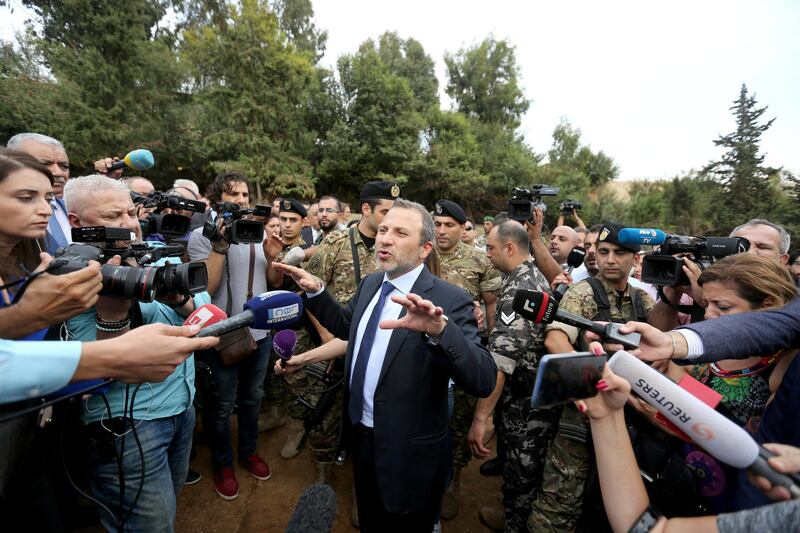Hezbollah has not set up any missile sites near Beirut's airport, Lebanon's Foreign Minister Gebran Bassil said, in response to claims by Israel at the UN General Assembly.
The minister, whose Christian Free Patriotic Movement has been a political ally of Hezbollah since 2006, led dozens of ambassadors on a tour of the area close to Beirut-Rafic Hariri International Airport in a bid to discredit Prime Minister Benjamin Netanyahu’s claims.
Mr Bassil accused Israel of seeking to “justify another aggression” on Lebanon on the basis of "false and ignorant claims that will impact the stability of the region".
"We refuse to have missile sites near the airport, but other countries must also help us stop Israel's terrorism, and this is the responsibility of the United Nations," the minister said.
Ambassadors from Saudi, Kuwait, the UK and Russia were among the diplomats who attended Mr Bassil's tour. United States ambassador to Lebanon, Elizabeth Richard, was absent.
Beirut and Tel Aviv have never had formal diplomatic or economic relations, and a guerrilla campaign by Hezbollah forced Israel to pull out of occupied south Lebanon in 2000.
However the two sides clashed again in the 34-day 2006 war.
Last week at the UN General Assembly in New York, Mr Netanyahu said Israel had evidence that Iran was helping Hezbollah to provide precision-guided accuracy for its missiles.
_________
Read more:
Iran's FM calls Benjamin Netanyahu's claims at UN an 'obscene charge'
Gebran Bassil: Lebanon does not accept Syrians as 'refugees'
The future of Lebanon's political dynasties
Hezbollah is flaunting its support for Yemen’s Houthis
________
The Israeli premier said Iran had been directing Hezbollah in Lebanon "to build secret sites to convert inaccurate projectiles into precision-guided missiles, missiles that can target deep inside Israel within an accuracy of 10 metres".
He claimed Hezbollah had three missile sites near the airport – one in Ouzai, another under the Ahed Stadium and a third directly adjacent to the airport; all areas in and near Beirut's southern stronghold of Hezbollah supporters, known collectively as Dahiyah.
“Look at this, next to the facility there is a soccer field. I have a message to Hezbollah: Israel knows what you are doing and where you’re doing it, and it will not let you get away with it," Mr Netanyahu said.
The sport stadium was a stop on Mr Bassil’s tour. He showed the delegation the handball and indoor football pitch at the site and introduced the president of the club, Tamim Suleiman.
“Al Ahed Sports Club is dedicated to spreading a culture and awareness of sport," Mr Suleiman said, adding the site is Fifa accredited. "It is surprising to face this attack today."
Mr Bassil countered the claims by saying that Lebanon would not accept Israel's misuse of the UN as a platform to attack his country. "Lebanon demands Israel ceases this madness, we will no longer be the victim of some regional deal," he said.
The Israeli military released footage and photos shortly after Mr Netanyahu's speech.
The video refers to a “Missile Accuracy Project (Map)” which Israel says Hezbollah has tried to transfer “to the heart of the city of Beirut”.
The Israeli military said the deployment of the facilities close to Beirut's airport were “knowingly jeopardising the Lebanese civilian population”.
Israel bombed Beirut's airport at the outbreak of the conflict and obliterated large parts of the southern suburbs and the south of the country in 2006, as part of a military strategy dubbed the Dahiyah doctrine — inflicting suffering on civilian populations to turn supporters away from the group.
Israel claims the deterrence of the Dahiyah doctrine has prevented a major conflict for more than 12 years.
In response to Israel's allegations, Hezbollah youth and sports minister Mohammad Fneish said the country would resist Israeli aggression.
“Leave Netanyahu with his lies and illusions. We will suffice with the fact the resistance has its power, as [Hezbollah leader] Hassan Nasrallah pointed out, and we will stand to every Israeli aggression in Lebanon," Mr Fneish told the state-run National News Agency.
Israel has targeted Hezbollah positions dozens of times in Syria, where the group is fighting on the side of the regime in the civil war against rebels and extremists.
Earlier on Monday, Mr Bassil held talks with Austria's foreign minister, Karin Kneissl, on the return of Syrian refugees, stabilisation and the reconstruction in Syria.
Ms Kneissl urged the international community to seize "a new dynamic" developing in Syria, which has been mired in civil war for more than seven years.
She said Austria would help those willing to return like it did with Bosnian refugees after the end of their war.
Mr Bassil said that Lebanon, which hosts more than a million Syrian refugees, is working to ensure their "fast, secure, honourable and sustainable" return. Tens of thousand of refugees have reportedly already returned to Syria.
Mr Bassil has been a long-term vocal critic of hosting Syrian refugees and has called for and tried to help organise their return home, despite warnings from the international community that it is not yet safe to do so.
"Security now prevails" in most of Syria, making it possible for refugees to return, he said.






